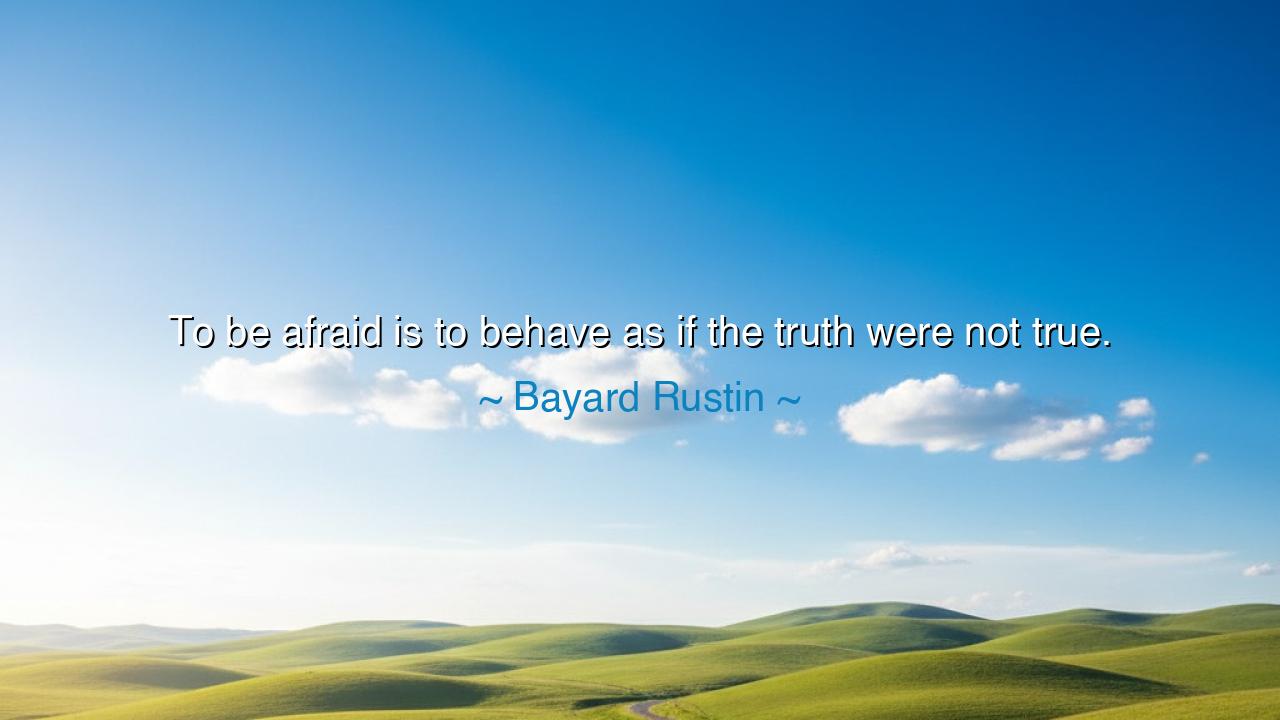
To be afraid is to behave as if the truth were not true.






Hear the bold words of Bayard Rustin, strategist of justice and disciple of nonviolence, who declared: “To be afraid is to behave as if the truth were not true.” This is no idle phrase, but a commandment carved from the struggles of one who fought against hatred, injustice, and fear. In his wisdom, Rustin unveils the nature of fear: that it is not merely trembling of the body, but a denial of reality itself. To live in fear is to live as though the eternal truths of justice, dignity, and freedom are illusions. Fear bows before falsehood; courage stands upon truth.
The meaning of these words is profound. Truth is unchanging—it remains what it is, regardless of men’s opinions or the threats of tyrants. But fear blinds the soul, making us forget what we already know. When we fear, we behave as though lies were stronger than truth, as though cruelty were greater than justice, as though death were mightier than life itself. Rustin’s teaching is that fear does not change reality—it only changes our ability to live in harmony with it. To conquer fear is not to discover new truth, but to remember that truth was always true.
The ancients, too, echoed this wisdom. When Socrates faced death for speaking truth, he refused to flee. He declared that death was no evil, but falsehood and cowardice were. Had he chosen fear, he would have behaved as though the truth he taught was not truly worth dying for. Likewise, the Stoics taught that to fear is to rebel against the order of nature. Fear is not simply weakness—it is rebellion against reality, a denial of what already is.
Consider Rustin’s own age, the days of the Civil Rights Movement. He stood shoulder to shoulder with Martin Luther King Jr., helping to shape the great March on Washington in 1963. There were those who trembled, who feared the violence of police, the wrath of segregationists, the endless weight of oppression. Yet Rustin declared that to yield to fear was to act as if the truth of equality were not real, as if injustice were eternal, as if the promises of freedom were mere dreams. By rejecting fear, the movement embodied truth, and in time, that truth began to prevail.
History bears countless witnesses to this. Think of Mahatma Gandhi, who led millions in India through nonviolent resistance. If he and his people had given in to fear, they would have behaved as though the truth—that no empire can enslave the human spirit—were not true. Instead, they held fast, even under the blows of batons and the weight of prison cells, and their courage revealed the truth to the world. Fear was the lie; truth was the reality.
The lesson is clear: do not let fear drive you from the truth. Fear may whisper that you are weak, that justice will not prevail, that speaking truth will bring only harm. But remember Rustin’s words—fear is itself a falsehood. When you yield to it, you act as though what is real is not real. The world may tremble, but truth does not. The tyrant’s threats cannot erase what is eternal, nor can cruelty undo what is right.
Therefore, O seeker, live with courage rooted in truth. When fear comes, do not ask whether the truth is strong enough; ask whether you are willing to live in harmony with it. Remember: to be afraid is to behave as if the truth were not true. Stand firm, speak boldly, and walk faithfully, for the truth does not depend upon your fear, but your fear depends upon your forgetting. And when you remember, fear will fall away like shadow before the rising sun.






QQuynh
This quote makes me question how fear impacts our choices and actions. We often know the truth but avoid it because of the fear it brings. Do you think people are more likely to act out of fear than embrace the truth? What steps can we take to shift from avoiding uncomfortable truths to facing them courageously? How do we build the strength to act on the truth even when it’s terrifying?
ABAnh Bui
Rustin’s statement really resonates with me because it suggests that fear is a form of self-deception. When we’re afraid, we act as if the truth isn’t real, even though we may know it deep down. How can we learn to confront fear head-on, without letting it alter our perception of reality? Do you think facing the truth requires a kind of bravery that goes beyond just knowledge?
TH09.Nguyen Tri Hoa
This quote by Rustin raises a compelling point about the power of fear. It’s easy to understand how fear can make us behave irrationally, but the idea that fear leads us to ignore the truth is profound. Why do you think people are more inclined to run from the truth when faced with fear? Do you think fear is sometimes a defense mechanism, or does it reveal our deeper insecurities about the truth?
GZGames Zom
I find this quote particularly insightful because it links fear with denial of the truth. It makes me wonder: when we’re afraid, are we trying to protect ourselves from reality? Does fear make us reject the truth, even if we know deep down it’s the right thing? What are the psychological mechanisms behind how fear distorts our relationship with the truth? How do we overcome this fear to embrace what’s real?
TSNguyen Tung Son
Rustin’s quote really makes me reflect on how fear can cloud our perception of reality. When we’re afraid, we often act as though what we fear is more powerful than the truth itself. Have you ever experienced a situation where fear made you doubt what you knew to be true? How do you think fear distorts our understanding and behavior, especially when it comes to confronting uncomfortable truths?